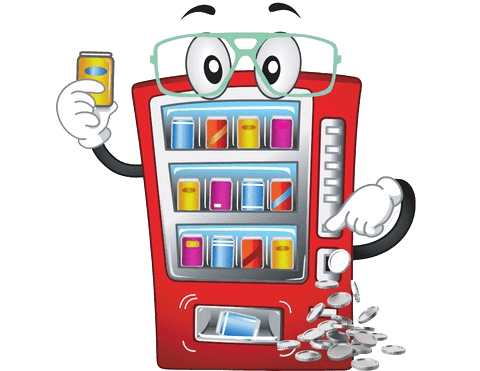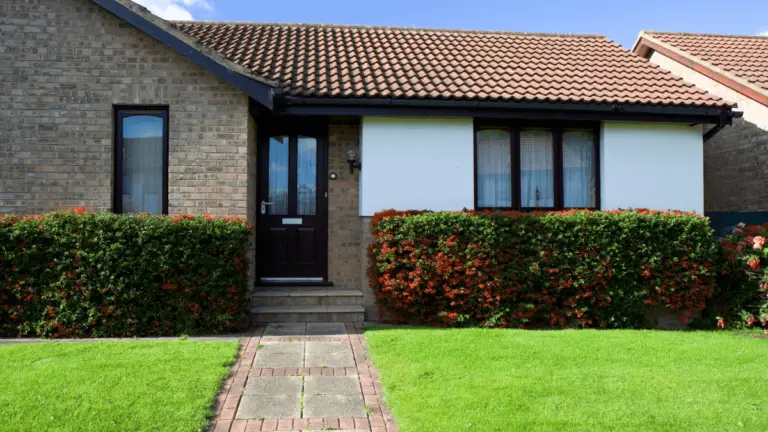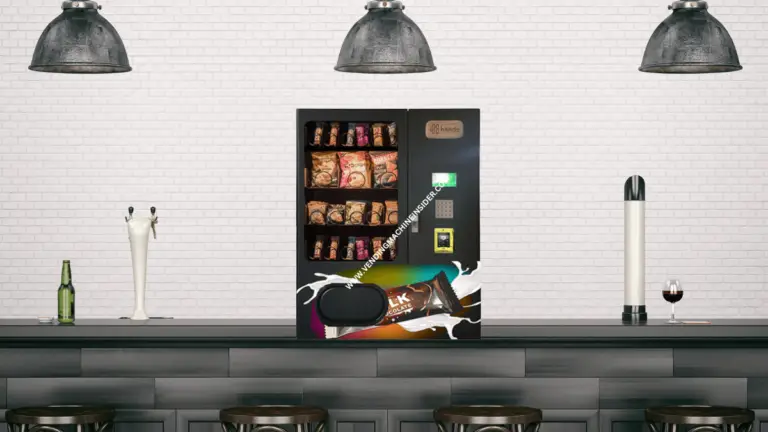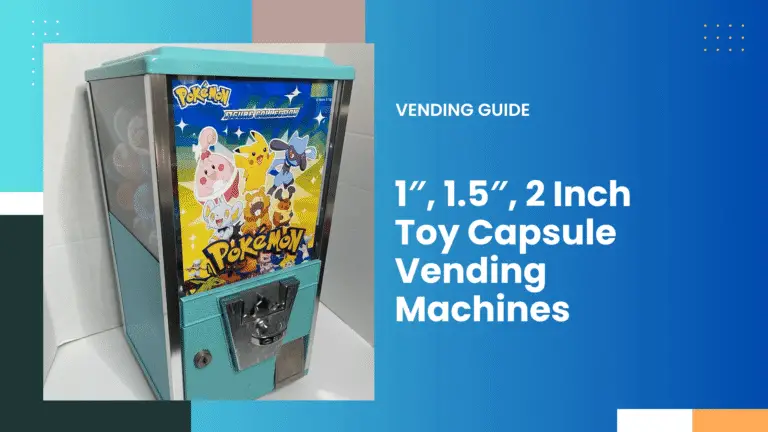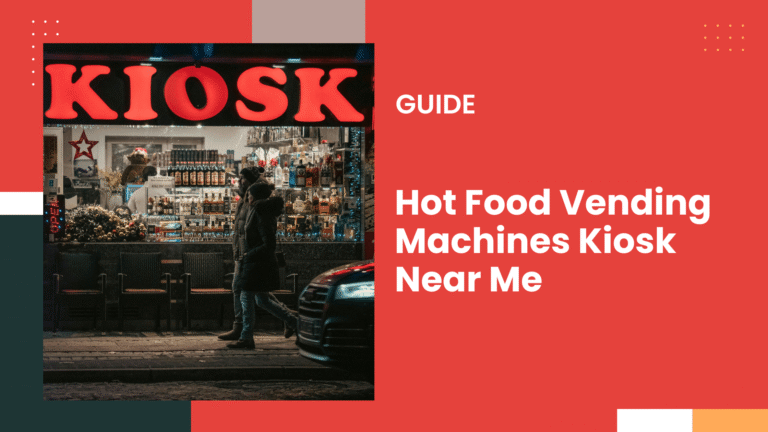Tobacco Vending Machine For Sale | Federal & State Legal Compliance
Browse Tobacco vending machines for sale with full federal and state law guidance. Stay compliant, choose licensed options, and get expert info before you buy.
1. AMS CM36 Tobacco Vending Machine
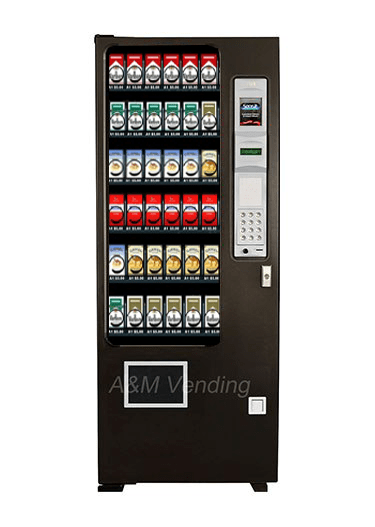
- 36 Product Choices – Adjustable slots to stock cigarettes, vape items, and smoking accessories.
- Guaranteed Vend System – Uses Sensit® technology to ensure every purchase delivers, or the customer can choose again or receive a refund.
- Energy-Saving Design – EnergySensit® reduces power usage, cutting long-term costs.
- Space-Efficient Footprint – Narrow three-wide design, ideal for clubs, lounges, and other indoor spaces.
- Flexible Pricing – Set item prices anywhere from $0.00 up to $100.00.
| Category | Details |
|---|---|
| Model | AMS CM36 Ultimate Cigarette Vending Machine |
| Number of Selections | 36 (adjustable configuration) |
| Price Range | $0.00 – $100.00 |
| Dimensions | 72″ H × 28.5″ W × 29.5″ D |
| Approximate Weight | 500 lbs |
| Electrical | 120 VAC, 7 amps |
2. eVending Cigarette and Vape Vending Machine
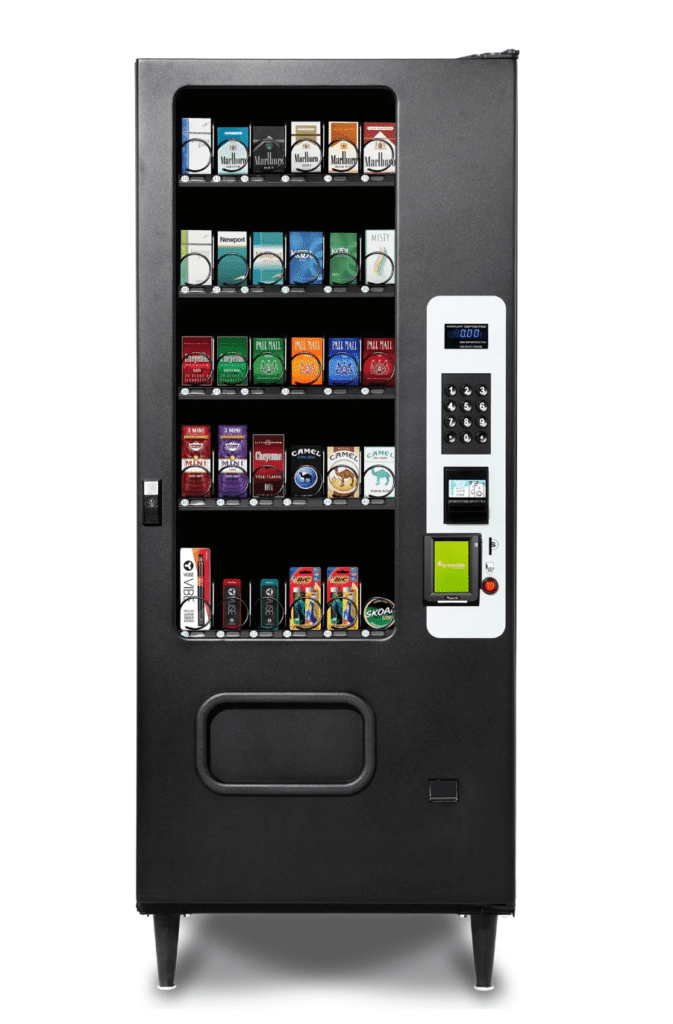
- Multi-Product Capacity – Holds up to 450 packs across 30 adjustable selections.
- Flexible Payment Options – Accepts coins, cash, credit/debit cards, and mobile wallets.
- iVend® Sensor System – Guarantees product delivery or refunds.
- Bright LED Lighting – Ensures clear visibility even in low-light environments.
- Compact Footprint – Slim design that fits lounges, clubs, and other indoor spaces.
- Accessible & User-Friendly – Braille keypad and illuminated display for easy operation.
| Category | Details |
|---|---|
| Selections | 30 product slots |
| Capacity | ~450 packs (varies by configuration) |
| Payment Systems | Premium coin acceptor; Bill acceptor ($1, $5, $10, $20); Credit/Debit & Mobile Payments |
| Controller | GVC1 |
| Delivery Assurance | iVend® sensor technology |
| Lighting | LED illumination |
| Accessibility | Braille keypad |
Check here for the Weed Vending Machine.
Tobacco Vending Machines in the U.S.: A Complete Guide for Operators & Investors
Tobacco vending machines once dotted American bars, diners, and bowling alleys. Today their presence is far more limited, shaped by tighter regulations, evolving payment technology, and shifting consumer habits.
What Are Tobacco Vending Machines?
Legality in the United States
Licensing and Compliance
Placement Opportunities
Leading Brands & Models — Features, Specs & Pricing
Seaga SM24 — Countertop 24-selection model
Seaga’s SM24 is a compact countertop tobacco vending machine widely used in lounges and small venues where space is limited.
| Capacity | Up to 24 individual selections (varies by pack or pouch size). |
| Dimensions | Approx 20″ H x 12″ W x 12″ D (countertop form factor). |
| Security | Welded steel door, tubular lock; optional alarm integration. |
| Payments | Coin mech standard; bill validator & cashless / cardreader optional. |
| Connectivity | Optional telemetry kit for remote inventory monitoring. |
AMS CM36 — Medium-capacity (36 selections)
AMS’s CM36 is a modular high-capacity unit built for venue owners needing more SKUs and a glass-front merchandising display.
| Capacity | 36 selections (configurable tray layouts for different pack sizes). |
| Dimensions | Floor model (exact dims vary by config). |
| Security | Heavy-gauge cabinet, multi-point lock, tamper sensors optional. |
| Payments | MDB coin mech, bill validator standard; cashless readers & NFC optional. |
| Connectivity | Supports telemetry and remote stock/status alerts. |
AMS CM60 — High-capacity (60 selections)
AMS CM60 expands capacity for operators requiring a large SKU footprint and increased inventory for busy venues.
| Capacity | Up to 60 selections (configuration-dependent). |
| Dimensions | Floor model — typically larger footprint (varies by manufacturer config). |
| Security | Heavy cabinet, keyed multi-point locks, optional remote tamper alert. |
| Payments | Coin/bill standard; cashless & app-based payments often available. |
| Connectivity | Telemetry & remote reporting for inventory and errors. |
Azkoyen Step Series — Touchscreen + IoT capable
European design optimized for modern payments and connectivity; touchscreen models and IoT telemetry are typical.
| Capacity | Varies by model & tray config (common: 24–48 selections). |
| Dimensions | Model-specific; many touchscreen units are compact countertop or slim floor models. |
| Security | Solid steel construction with reinforced locks; remote alarm options. |
| Payments | Native card readers, NFC, optional mobile wallet; cashless preferred. |
| Connectivity | Full IoT support — remote reporting and cloud dashboards (usually subscription). |
Custom Slimline Models — Compact, upscale installs
Slimline / custom counter units are built for discreet installations and boutique venues where design matters.
| Capacity | Often 8–24 selections (compact trays or single-pack dispensers). |
| Dimensions | Compact countertop sizes — design-dependent; ideal for counters & slim spaces. |
| Security | Standard lock and tamper-resistant cabinetry; customization available. |
| Payments | Often refurbished with aftermarket cashless readers or simple coin/bill mechanisms. |
Startup Costs & Profitability
Setting Up a Tobacco Vending Machine
- Secure all required state & local licenses and verify machine-specific rules.
- Purchase or lease machines suited to your venue; ask for refurbishment & testing records when buying used.
- Negotiate placement and revenue-share agreements with venue owners.
- Install and secure the machine in a controlled adult-only area.
- Stock with tax-stamped product sourced from licensed wholesalers and maintain accurate records.
The Bottom Line
Tobacco Vending Machine Legality by State (U.S.)
| State | Legal status / conditions |
|---|
